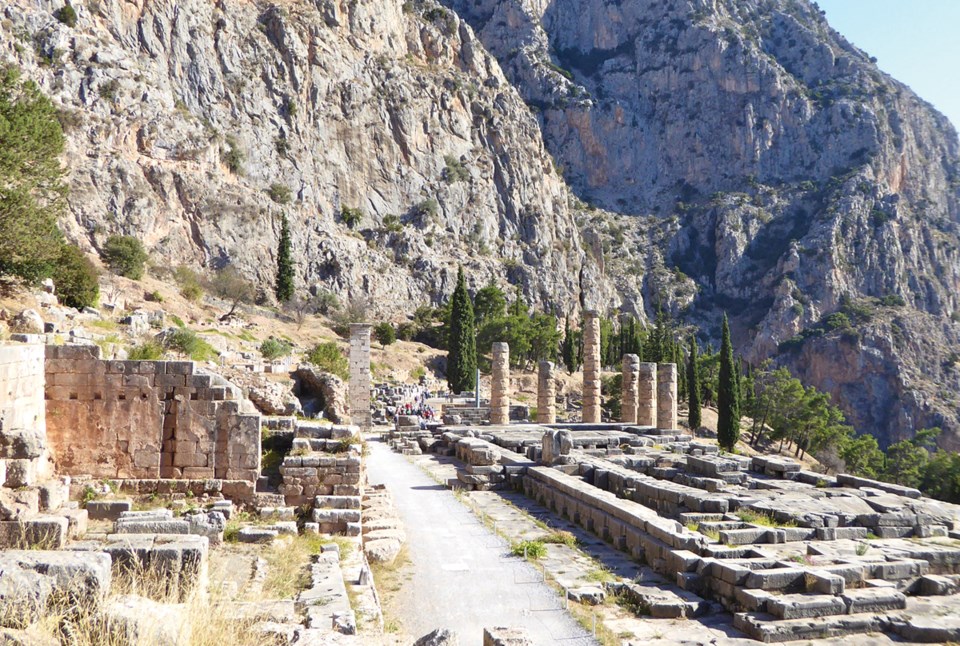A Viking Star cruise to explore ancient Mediterranean civilizations begins with an excursion to Delphi. Departing Piraeus, Greece, our coach skirts Athens and heads northwest.
Beyond the suburbs, fields of grain and cotton flourish below sun-baked hillsides. “To the east lies Marathon Lake, where in 490 BC 10,000 Athenians defeated King Darius’s army of 100,000 soldiers,” Yani recounts. “Few realize most of the Persian soldiers re-boarded their boats and sailed around the peninsula to renew the invasion. The Athenians quick marched overland to meet them. Sighting them, Darius believed this represented a new army. So his Persian troops retreated homeward, completing Athens’ victory.”
Yani soon points out a small hillside town. “That’s the oldest city in Greece. According to legend, an oracle on Crete dispatched Europa’s son with a cow to help him decide on a new settlement. That cow chose to graze there, establishing Thebes.”
An hour later upward, Yani welcomes us to Delphi, the most sacred city of ancient Greece. Green cypress, pines and sprawling shrubs surround this arid site perched on the side of Mount Parnassus. The Sacred Way leads us zigzagging up. Passing a number of olive trees, we stop at a line of terra cotta walls. These represent remnants of shops where pilgrims purchased offerings for the gods.
Nearby, weathered pedestals define the arcade that once displayed such tributes. Beyond this, our stony pathway borders several ruins of treasury houses. Most impressive, the marble block Athenian Treasury commemorates the triumphant Battle of Marathon. Nearby, a plaque explains a large ovoid stone. Zeus threw this legendary stone around the world to locate the earth’s navel. The myth seems strangely credible, as Delphi remains a tectonic vortex of springs, gas vents and earthquakes.
Apollo dominates the sanctuary. White Doric columns rise from the marble block floor of his temple, Delphi’s largest structure. “Oracles spoke from the same crevice where Apollo killed a python. Oracles, called pythia, were chosen from reliable middle-aged women to dispense advice on auspicious days,” Yani explains. “Pythia chewed laurel leaves, sniffed noxious gases and responded to shouted questions with gibberish! Priests interpreted their ‘godly prophecies’ as puzzles.”
“Pythia advised Oedipus to seek his parents in Thebes. This haphazard quest ends up with him confronting the city’s monster. The sphinx challenges Oedipus with a riddle: ‘What moves on four, then two, then three?’ Oedipus triumphs, replying, ‘Man as a child, an adult and elder with a cane.’ A plague ensues. Oedipus returns to Delphi to learn the cause,” Yani recounts.
“The oracle explains, ‘That miserable old man you killed on route to Thebes was your stepfather, the king. The queen you married, rewarding your defeat of the Sphinx was your mother.’ Understanding, Oedipus blinds himself; his mother commits suicide. Delphi’s sagacity is etched on temple stones: 47 maxims including know thyself.”
Learning how Delphi’s Pythian Games further honored Apollo, god of life, science and art, we proceed up the Sacred Way to the first venue, an amphitheatre carved out of the hillside. Musicians, poets and actors competed on stage before 5,000 attendees. And on the opposite side of its ridge, we see the stadium representing the games’ second phase. It’s easy to imagine athletes in the huge oval running, jumping, wrestling, hurling discs and throwing javelins.
The on-site museum displays delightful artwork, including an illustration of ancient walled Delphi with grand columned buildings and glorious statuary. Yani highlights two masterpieces: a polychrome platter intricately picturing a lovely woman feeding a blackbird and a finely detailed bronze charioteer cast 2,500 years ago.
Delphi provides extraordinary insights into ancient Greece and an inspiring start to our amazing investigations.
See www.vikingcruiselines.com for Mediterranean itineraries.



